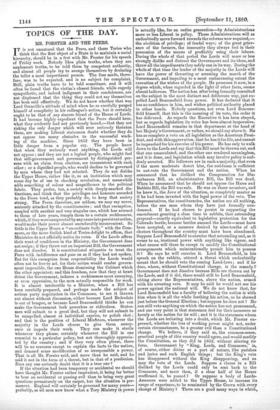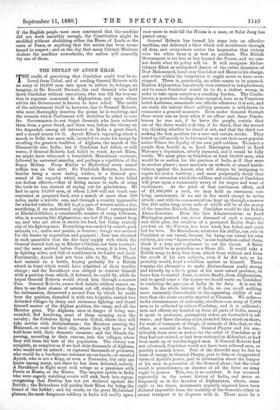TOPICS OF THE DAY.
MR. FORSTER AND THE PEERS.
IT is not unnatural that the Peers, and those Tories who think that the first object of a State is to maintain a social hierarchy, should be in a fret with Mr. Forster for his speech of Friday week. Nobody likes plain truths, when they are unpleasant truths, to be told them by competent authority, and almost all people try to avenge themselves by declaring the teller a most impertinent person. The fuss made, there- fore, was to be expected, and is no subject for complaint. Still, plain truths have to be told sometimes, and it will often be found that the victim's closest friends, while eagerly sympathetic, and indeed indignant in their condolences, are not displeased that the thing they could not say themselves has been said effectively. We do not know whether that was Lord Granville's attitude of mind when he so carefully purged himself of complicity in his colleague's action, but it certainly ought to be that of any sincere friend of the House of Lords. It had become highly expedient that the Peers should hear, what they evidently had not previously heard,—that they are risking the only danger which will ever seriously threaten them, are making Liberal statesmen doubt whether they do not oppose too many obstacles to the successful work- ing of the machine. Since 1832 they have been in little danger from a popular cry. The people know that when they seriously want anything, the Lords will not oppose ; and they are not a logical people, who might feel that self-government and government by distinguished per- sons with no claim from election, are inconsistent with each other ; or a dignified people, who would decline to be governed by men whom they had not selected. They do not dislike the Upper House, rather like it, as an institution which may some day be of use in checking revolution, and meanwhile adds something of colour and magnificence to the political fabric. They prefer, too, a society with deeply-marked dis- tinctions, and think that the privileges and honours accorded to the Peers tend, as they probably do, to keep that society strong. The Peers, therefore, are seldom, we may say never, seriously attacked by the constituencies ; and that exemption, coupled with another and very singular one, which has accrued to them of late years, tempts them to a certain recklessness, which, if they were exasperated by any cause into persistent action, would make their power almost unendurably inconvenient. So little is the Upper House a " co-ordinate body" with the Com- mons, as the more foolish kind of Tories delight to affirm, that Ministries do not officially notice its votes. If the Lords affirm their want of confidence in the Ministry, the Government does not resign ; if they throw out an important Bill, the Government does not dissolve. It is constitutional etiquette to treat the Peers with indifference and pass on as if they had not spoken. But for this exemption from responsibility the Lords would often not be free to act, for their action would render govern- ment impossible, the one House dismissing the Cabinet which the other appointed; and this freedom, now that they at heart detest the Government, induces a recklessness most annoying, or even oppressive, to the men actually responsible for work. It is almost intolerable to a Minister, when a Bill has been carefully prepared, and perhaps made the subject of serious party negotiation in the Commons, to see it thrown out almost without discussion, either because Lord Redesdale is out of temper, or because Lord Beaconsfield thinks he can make the Government look powerless or ridiculous. States- men will submit to a great deal, but they will not submit to be compelled, almost at individual caprice, to polish shot ; and that is the position of Liberal Ministers, whenever the majority in the Lords choose to give them annoy- ance or impede their work. They can make it sterile whenever they please, certainly whenever the Bill is one essential to a particular policy, but not thoroughly apprecia- ted by the country ; and if they very often please, there will be no resource except to explain the facts to the nation, and demand some modification of so irresponsible a power. That is all Mr. Forster said, and more than he said, and he said it not in the form of a threat, but in that of a prediction. Does any one seriously doubt that it is a true one ? If the situation had been temporary or accidental we should have thought Mr. Forster rather imprudent, it being far better to bear an accidental or passing evil than to bring very great questions prematurely on the carpet, but the situation is per- manent. England will certainly be governed for many years— probably, as all men now know what a Tory Ministry in power is actually like, for an entire generation—by Administrations more or less Liberal in policy. Those Administrations will as undoubtedly move forward towards the reforms now required,— the abolition of privilege; of feudal ways; of the great griev- ance of the farmers, the insecurity they always feel in their possession of the means of profitably using their labour. During the whole of that period the Lords will more or less strongly dislike and distrust the Government and its ideas, and throw all the impediments they safely can in its way. During the whole of that time the leader of the majority in the Lords will have the power of thwarting or arresting the march of the Government, and impeding to a most embarrassing extent the execution of the wishes of the people. He possesses it now, in a degree which, when regarded in the light of other facts, seems almost ludicrous. The nation has, after being formally consulted on the subject in the most distinct and deliberate way, just ex- pelled Lord Beaconsfield from power. It has declared that it has no confidence in him, and wishes political authority placed in other hands. Nobody questions, not even Lord Beacons. field himself, that this is the meaning of its vote, the order it has delivered. As regards the Executive it has been obeyed, but as regards legislation its voice has been almost inoperative. Lord Beaconsfield remains in that department at the head of her Majesty's Government, or rather, we should say above it. He has as complete a veto on all legislation as the American Presi- dent, and with this aggravation, that he has it for life, and cannot be impeached for his exercise of his power. He has only to walk down to the Lords and say that this Bill must be thrown out, and that one emasculated, and the other one rendered meaningless, and it is done, and legislation which may involve policy is sud- denly arrested. His followers are in such a majority, that event if the more moderate desert him, the residuum is sufficient to out-vote the Government and the nation. When he announced that he disliked the Compensation for Dis- turbances Bill, an administrative Bill, the Bill was dead. When he announced that he should not oppose the Hares and Rabbits Bill, the Bill was safe. He was on those occasion, and he knew it, the Jove of the situation, as completely master as if he had been invested with the legal power of the veto. The Representatives, the constituencies, the nation are all nothing, before the one man whom they have just formally con- demned. If he had chosen to persist in supporting the amendment granting a close time to rabbits, that astounding proposal—exactly equivalent to legislative protection for the Colorado beetle, because beetles amused the Lords—must have been accepted, or a measure desired by nine-tenths of alb electors throughout the country must have been abandoned. Suppose Lord Beaconsfield to exercise that astounding and, as it seems to us, irrational power with anything like vigour, and what course will there be except to modify the Constitutionals arrangements which unintentionally permit him to possess it ? He says he will exercise it. Lord Beaconsfield, in his. speech on the rabbits, uttered a threat which undoubtedly meant that he should veto the coming Land-laws ; and if he does, where, without Constitutional change, is the remedy t Government does not dissolve because Bills are thrown out by the Lords, and if it did, there would still be Lord Beaconsfield,. sitting above the Representatives, above the nation, armed with his arresting veto. It may be said he would not use his. power against the national will. We do not know that, for Lord Beaconsfield has a faculty of believing the nation is with him when it is all the while loathing his action, as he showed just before the General Election ; but suppose he does not I He still veto anything on which the nation has not pronounced, and our very point is that statesmen feel for their measures as= keenly as the nation for its will ; and it is the statesmen whom the Lords are irritating into a doubt, which Mr. Forster ex- pressed, whether the loss of working power might not, under certain circumstances, be a greater evil than a Constitutional change. We believe, if they said so, the common-sense,. practical people of this country would agree, and would modify the Constitution, as they did in 1832, without altering its form. Government by " King, Lords, and Commons," is, of course, either divine or a part of nature, like parishes and juries and such English things ; but the King's veto has disappeared without the King disappearing, and so may the veto of the Lords. Suppose a clause in a Bill disliked by the Lords could only be sent back to the Commons, and must then, if a clear half of the House reaffirmed it, be passed I Or suppose a body of Lords- Assessors were added to the Upper House, to increase its range of experience, to be nominated by the Crown with every change of Ministry Y There are a good many ways in which, if the English people were once convinced that the machine did not work smoothly enough, the Constitution might be modified without abolishing either the House of Lords or the caste of Peers, or anything that the nation has been accus- tomed to respect ; and on the day that many Cabinet Ministers declare the machine unworkable, the nation lyill assuredly try one of them.



































 Previous page
Previous page